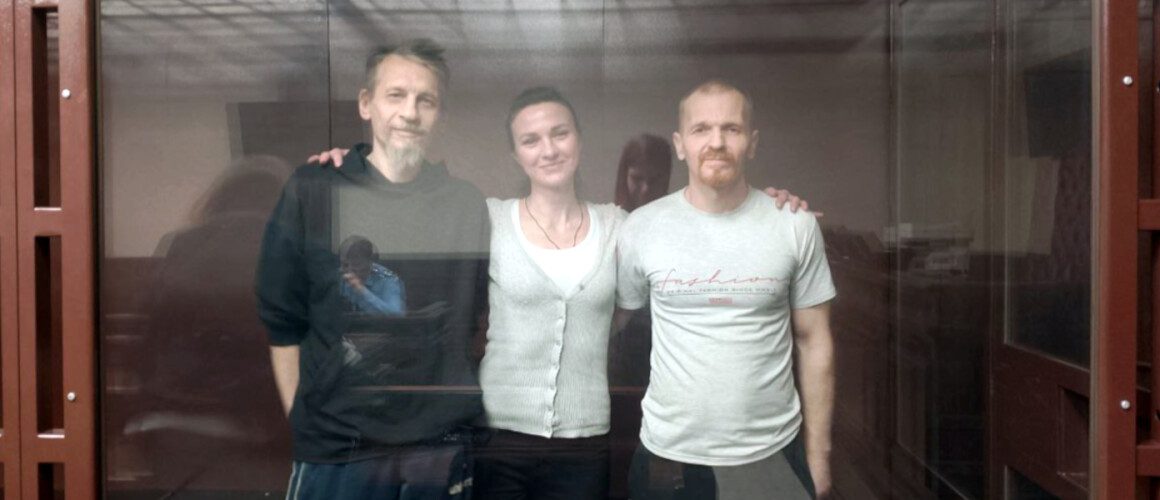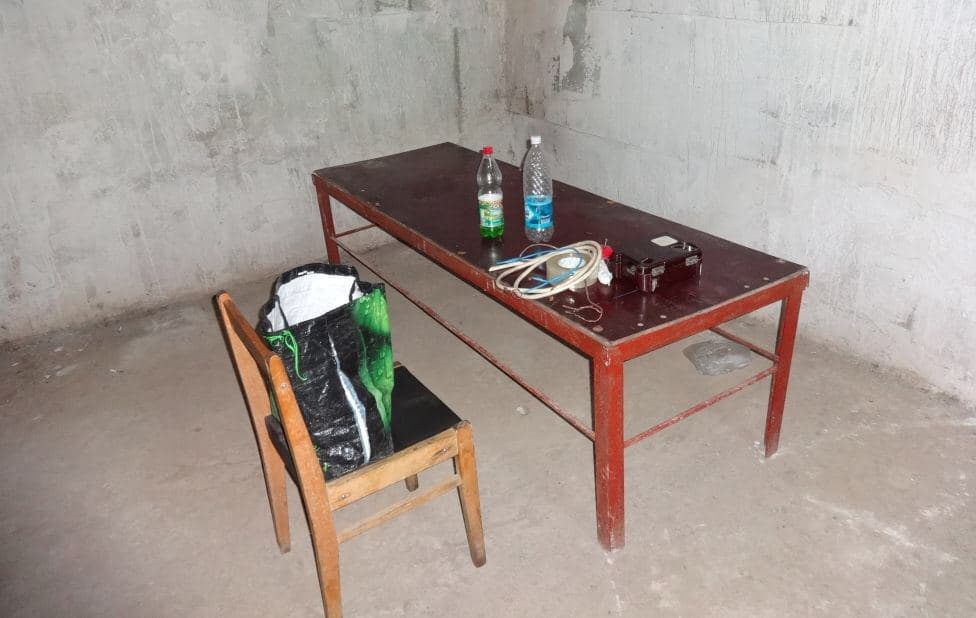
15 Russians raped her for false confession – Ukrainian mother gets 18-year sentence after years of torture in secret Russian prison
In a harrowing testimony before Russia’s Southern District Military Court, Ukrainian citizen Natalia Vlasova has provided a detailed account of systematic torture and abuse she endured while detained in Russian-occupied Donetsk, following her arrest in March 2019. Vlasova, along with two other Ukrainians, received a lengthy prison sentence under Russia’s flawed “terrorism” allegation.
On 24 December 2024, the court sentenced Vlasova to 18 years in prison, while her co-defendants Serhiy Hruzynov and Victor Shydlovsky received 20 and 22 years respectively.
In her court testimony, Vlasova described systematic torture at the notorious Izolyatsia prison, a secret detention facility in Donetsk that has become infamous for its brutal treatment of Ukrainian detainees and that former inmates have dubbed “the death factory.” She detailed how her captors subjected her to extreme physical and psychological abuse. “Not every person would be capable of taking pleasure from causing pain to a naked and bound woman,” she testified.
“They undressed me and bound me with scotch tape, poured water over me and turned on the current,” she testified. “If I didn’t scream enough, they increased the current and the shocks became even more intense. They needed a reaction. I didn’t understand that straight away, then when I screamed loud enough, I heard their satisfied voices.”
Vlasova testified about the sexual violence. She said at the court that fifteen men arrived to rape her systematically. “On this occasion, they even took me to shower. As a rule, they were in a state of alcoholic intoxication.”
The prisoner testified that she sensed her torturers were interrogating her purely for their own amusement, describing how they derived pleasure and entertainment from inflicting pain.
Vlasova’s captors used her role as a mother to heighten her psychological torture. They claimed to know which kindergarten her five-year-old daughter attended and threatened to deliver an explosive-laden toy to the child. “I didn’t doubt they were capable of anything,” Vlasova said.
Vlasova described how when the torture became relentless, she eventually reached a state of emotional numbness.
“When torture frequency becomes overwhelming, at some point a period of indifference sets into what is happening and what will happen next. In any case, my fate is not in my control, my body does not belong to me,” Vlasova described.
The physical conditions of her detention were equally harsh. “After torture sessions, they would chain me in a ‘glass’ [tiny enclosed space] with my hands raised for the entire night, or put me in a tiny basement room where you could only sit or stand,” she testified. “It was desperately cold and they only left me a small amount of water.”
The case against Vlasova
The Russian prosecution claimed Vlasova, Hruzynov, and Shydlovsky were part of a terrorist organization working under orders from Ukraine’s Security Service (SBU) to assassinate Yevdokimov, one of the founders of the Izolyatsia prison in the “Donetsk People’s Republic,” Russia’s puppet entity in eastern Ukraine.
The mere fact that such a trial was held is a “legal absurdity” in the words of Halya Coynash from the reputable Kharkiv Human Rights Protection Group, “since Russia had consistently claimed to have nothing to do with the conflict in Donbas, and denies to this day the existence of the notorious Izolyatsia secret torture prison.” However, it does prove the extent to which Russia controls a “republic” it claims rebelled against Ukraine, as the Southern Military Court of Russia has been passing sentences against Ukrainian political prisoners, civilian hostages, and prisoners of war since 2014.

Ironically, Vlasova identified Yevdokimov as one of her torturers: “Yevdokimov himself filed down my teeth with a nailfile, twisted my nipples and tried to push a bottle into my vagina,” Vlasova testified, stressing that to the court, this torturer is the “victim.”
The only evidence presented at the court were video confessions extracted under torture. Some of these videos were also shown on the Russian TV channel Russia 1 (Rossiya 1). All these “confessions” shown during the trial were later retracted by the defendants as coerced. Despite this, Judge Oleg Cherepov proceeded with the convictions.
“I was like a marionette,” Vlasova explained about her videotaped confession. “They would bring me in a hood, sit me down, and then take me back to the basement.” She described how she was tortured if she deviated from the script they demanded she recite.
“It was very difficult for me to watch the video recording,” Vlasova told the court, fighting back tears. “I know what happened before it, when I was in the basement being tortured. They told me what I had to say – there was a young operative and an investigator sitting there. I spoke slightly differently and then was punished for it: they stripped me, performed executions with electric current because I deviated somewhere, didn’t speak precisely.”
UN report: Russian torture of Ukrainian POWs “widespread and systematic”
All three detainees strongly denied any involvement in plans to kill anybody, as well as involvement in the unidentified “terrorist organization.” Shydlovsky and Vlasova admitted only to the charge of using fake documents.
Vlasova’s case follows a well-known Russian tactic of using torture to extract incriminating testimonies out of Ukrainians, which it has been employing since the start of its war against Ukraine in 2014.
Other proceedings from that session
Co-defendant Serhiy Hruzynov also testified about torture during his detention. Following severe beatings, he required hospitalization in February 2019 at Kalinin Hospital in Donetsk. “Three operative officers were with me around the clock in the ward, they escorted me to procedures and back,” he testified.
Victor Shydlovsky similarly reported torture with electric shocks and beatings with plastic pipes and water bottles. “As a result of these and other tortures, I confessed not only to what I actually did, but also to a significant extent to things I was not involved in,” he stated to the court.
The defendants acknowledged having contacts with Ukrainian security services but maintained they were never involved in assassination plots.
Two other defendants in the case, Giya Kalanadze and Maksym Vorona, who had obtained Russian citizenship, received lighter sentences of 6 and 5.5 years respectively. A sixth defendant, Andriy Borzunov, died before sentencing.
Defenseless state of Ukrainian political prisoners
Vlasova’s detailed testimony adds to an extensive body of evidence about human rights violations in Russian-controlled territories, especially in the infamous Izolyatsia prison, originally an art center in Donetsk, was seized by Russian-backed militants in 2014 and repurposed into a clandestine detention and torture facility. Ukrainian journalist Stanislav Aseyev was imprisoned there from 2017 to 2019, during which he suffered extensive torture. His memoir, “The Torture Camp on Paradise Street,” provides a detailed account of the atrocities committed within Izolyatsia. In November 2021, Ukrainian authorities detained Denis Kulikovsky, the former chief warden of Izolyatsia, who was charged with crimes related to the torture of Ukrainian captives.
Vlasova’s account of the torture methods, including sexual violence and psychological abuse, aligns with reports from other former inmates of Izolyatsia and similar facilities. Sexual violence has been systematically used as a method of torture against Ukrainian prisoners. Male detainees, in particular, have been targeted, enduring rape, forced nudity, and other forms of sexual abuse designed to humiliate and inflict psychological trauma.
The sentencing on 24 December has raised serious concerns among human rights organizations and highlighted the ongoing use of torture to extract confessions and the defenseless state of Ukrainian political prisoners in Russian detention facilities.
As Vlasova described her ordeal: “After they had violated my being, trying to destroy everything human in me, the least they did was give me dirty plates with leftover scraps, not empty the bucket of excrement. They humiliated me in ways that make it impossible to understand how I endured it all. I had not caused harm to anyone and had no intention of doing so.”
Related:











